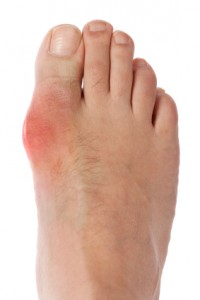What is Gout?
 Gout – also called metabolic arthritis – is a type of arthritis caused by the build up of uric acid in the blood. This excess uric acid causes monosodium urate crystals (or uric acid crystals) to form on the cartilage of the joints and tendons and their surrounding tissues. These joint crystals are needle shaped and cause sudden, excruciating, burning pain along with swelling, warmth, redness, and stiffness in the affected joints. One with gout may also have shiny purple skin around their joints. Gout usually strikes in the big toes first, but it may also be found in the ankles, heels, knees, wrists, fingers, and elbows. The symptoms can come on very quickly. One can go to sleep feeling great and wake up several hours later in excruciating pain.
Gout – also called metabolic arthritis – is a type of arthritis caused by the build up of uric acid in the blood. This excess uric acid causes monosodium urate crystals (or uric acid crystals) to form on the cartilage of the joints and tendons and their surrounding tissues. These joint crystals are needle shaped and cause sudden, excruciating, burning pain along with swelling, warmth, redness, and stiffness in the affected joints. One with gout may also have shiny purple skin around their joints. Gout usually strikes in the big toes first, but it may also be found in the ankles, heels, knees, wrists, fingers, and elbows. The symptoms can come on very quickly. One can go to sleep feeling great and wake up several hours later in excruciating pain.
So Who Gets It?
Anyone can get gout, but it mostly attacks men in their 40s and 50s. Women and children are better able to excrete uric acid efficiently, so this type of arthritis rarely affects them. Having others in our family who suffer from gout increases a person’s risk.
What Causes Gout?
The distinguishing characteristic of gout is high concentrations of uric acid in the bloodstream. Uric acid comes from eating foods that are high in purines. Purines are a subclass of proteins that are present in high quantities in human tissues and foods like sardines, anchovies, mushrooms, asparagus, lentils, legumes, dried peas, organ meats, (liver, kidneys, brains, sweetbreads), and meat extracts. There are also supplements and drugs that can raise one’s uric acid levels; some of these are niacin (vitamin B3), excess vitamin C, and salicylates (the active component of aspirin). Prescription drugs that can cause this include levodopa (for Parkinson’s disease), cyclosporine (to prevent rejection of transplanted organs), and diuretics that are prescribed for high blood pressure, edema, or cardiovascular disease. Acidic conditions of the blood caused by infections or surgery can also cause gout, as can exposure to lead.
Gout and Diet
Though there is no cure for gout, there is much that you can do to minimize flare-ups. The first place to start, as always, is to make lifestyle changes. I would recommend changes to diet first of all. Changing to an anti-inflammatory diet and following these guidelines would be highly beneficial.
- Avoid foods that are high in purines, such as organ meats, sardines, anchovies, lentils, peas, beans, mushrooms, cauliflower, and spinach.
- Eliminate all sources of caffeine from your diet.
- Minimize alcohol intake. Drinking alcohol promotes dehydration and irritates the urinary tract.
- Drink the right amount of water each day. The way to figure out how much water your body requires is to take your weight in pounds and divide that number in two. The answer is the number of ounces of water you should drink each day; for example, if you weight 150 pounds, you should drink 75 ounces of water daily. By drinking enough water, you will help flush the excess uric acid from your body.
- Maintain your proper weight. This will help many health issues—not just gout.
- In your quest to lose weight, do not employ ketogenic weight loss diets, like the Adkins diet. This increases your blood acid level.
- Eat tart cherries in all forms – fresh fruit, juice, or tart cherry extracts. Eating the equivalent of twenty tart cherries works like taking anti-inflammatory medications.
Dietary Supplements
- Fish oil capsules – Take them at least twice weekly (store in the freezer to avoid the fishy burps and aftertaste). Look for molecularly distilled products that are certified free of heavy metals and other contaminants.
- Bromelain supplements – This is a compound of digestive enzymes and other enzymes extracted from pineapple stems.
- Ginger and turmeric supplements—If you don’t already eat these regularly, consider adding them in capsule form.
- CoQ10— Take 60-100 mg daily with your main meal of the day.
Herbs
- Celery Extract/Seed
- Safflower
- Red Clover
- Nettle
- Thyme
There are two products you can find in health food stores and online that are combinations of these. They are Go-Out Capsules and Go-Out Tea. You may find similar products in your area.
Vitamins and Minerals
We all know that eating fresh foods with an abundance of veggies and fruit is the best way to get our vitamins, minerals, and micronutrients. Additionally, you can supplement your diet with this group of antioxidants.
- Vitamin C, 200 mg daily
- Vitamin E, 400 IU
- Selenium, 200 mcg of an organic form
- Mixed carotenoids, 10,000-15,000 IU
- Folic acid, 400 mcg
- Vitamin D, 2000 IU
- Calcium, 500-700 mg (for women only—men should avoid calcium supplements)
In closing, let me just remind you that before you make any changes to your regular diet and supplement regime, you should always consult your doctor or health care provider.
©2011 Off the Grid News
 Off The Grid News Better Ideas For Off The Grid Living
Off The Grid News Better Ideas For Off The Grid Living



